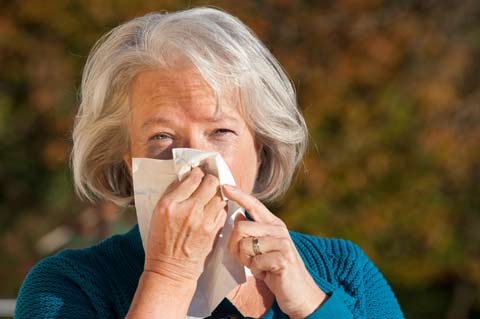Once again, government doctors urged us all to get the flu shot last year. How much did it help us?
If you’re a senior, not one bit. That’s what a new analysis shows.
It found that like most seasons, the flu vaccine performed dismally during the winter of 2016-17. It was only 42% effective.1
You might think that doesn’t sound so bad. At least it helped some people. But when you look at the data a bit closer, what you find is disturbing…
For one thing, the flu shot was almost completely ineffective last season in helping seniors. And they are the people who need it most. People 65 and older are hardest hit by the flu, suffering the most deaths and hospitalizations.2
The vaccine also did not help people 18-49 years of age. It was only marginally effective in children and in those 50-64.
In the past, the Centers for Disease Control has tried to blame the flu shot’s ineffectiveness on its formulation. In some years, the strains covered by the vaccine are not those that end up circulating in the U.S.
But this year, there is no such excuse.
The dominant flu strain was type A H3N2. It was supposedly covered in last year’s vaccine… But the shot was still virtually worthless in seniors and barely effective in everybody else.
How does the CDC explain this?
Jill Ferdinands is a flu epidemiologist with the CDC. She said, “While it is clear we need better flu vaccines, it’s important we not lose sight of the important benefits of vaccination with currently available vaccines.”
But what are those “benefits”? If a vaccine doesn’t prevent disease—as is the case with the flu shot in seniors—what good is it?
The CDC hasn’t answered those questions.
Vaccines against other infectious diseases are not considered successful unless they are at least 90% effective. But over the last 10 years, the flu shot has had an average effectiveness rate of only 46%. In four of the last five seasons, the vaccine has been largely worthless for seniors.3 4
Flu Shot Risks: What You Need to Know
Not only is the flu shot a failure, it’s dangerous. The CDC’s own website warns that possible side effects include:
- Soreness, redness, and/or swelling from the shot
- Headache
- Fever
- Nausea
- Muscle aches
- Fainting
The site also warns that there is a small risk of developing Guillain-Barre Syndrome. This disorder is caused by the immune system attacking the nervous system and causing rapid-onset muscle weakness. If it becomes acute, the patient has trouble breathing and can die.5
But these problems are just the beginning. There are other dangers…the flu shot contains toxic ingredients that no one should ever put in their body: 67
- Aluminum and mercury. Aluminum is added to boost the immune response of the vaccine. Mercury is used as a preservative. Both metals are potent neurotoxins. Aluminum is linked Alzheimer’s disease.8 9
- This toxin used to deactivate the flu virus in the vaccine. This ensures the shot doesn’t give you the flu. But formaldehyde is a well-known carcinogen.10
- Neomycin, gentamicin, and other antibiotics are added to the flu shot to stop bacteria from contaminating it.
- Polysorbate 80. This is an emulsifier that keeps vaccine ingredients evenly distributed. Emulsifiers are strongly linked to colon cancer.
Many scientists and health experts blame flu vaccines for the rise in Alzheimer’s disease. Some estimates say that if a person receives the vaccine for over three years in a row it increases the risk of developing the disease tenfold.11
Safe Alternatives to the Flu Shot
Since the flu shot contains dangerous ingredients and it doesn’t work for many people, it makes no sense to get it…especially since there are safe, effective alternatives:
Increase your vitamin D. Research shows adequate vitamin D prevents the flu. And if you do get the flu, vitamin D can greatly reduce the severity. Take a 5,000 IU supplement daily during the flu season.12
Vitamin C. It’s a powerful immune booster that prevents contagious diseases from taking hold in your body. Studies show that a 3,000 mg daily supplement reduces cold and flu symptoms by 85%.
Handwashing. The most effective way to avoid the flu is to make sure the virus doesn’t come in contact with your mouth or nose. Our hands are the main culprit for introducing germs into our body. Wash your hands thoroughly and often during flu season. Use an alcohol-based (non-triclosan) hand sanitizer.
Editor’s Note: Why do some people get the flu and others don’t? Scientists at the University of Michigan and Duke University Medical Center say it’s due to antioxidants. Find out more in this this special presentation.
Like this Article? Forward this article here or Share on Facebook.
References:
1 http://hosted.ap.org/dynamic/stories/U/US_MED_FLU_VACCINE?SITE=AP&SECTION=HOME&TEMPLATE=DEFAULT&CTIME=2017-06-21-18-11-32
2 http://abcnews.go.com/Health/wireStory/flu-vaccine-ineffective-people-65-older-winter-48185738
3 http://hosted.ap.org/dynamic/stories/U/US_MED_FLU_VACCINE?SITE=AP&SECTION=HOME&TEMPLATE=DEFAULT&CTIME=2017-06-21-18-11-32
4 https://www.cdc.gov/flu/protect/keyfacts.htm
5 https://www.cdc.gov/flu/protect/vaccine/general.htm
6 https://www.passporthealthusa.com/2016/10/what-ingredients-are-in-the-flu-shot/
7 http://www.healthline.com/health/cold-flu/flu-shot-ingredients#ingredients2
8 https://www.atsdr.cdc.gov/phs/phs.asp?id=1076&tid=34
9 http://www.dw.com/en/just-how-dangerous-is-mercury-anyway/a-16522491
10 https://www.cancer.org/cancer/cancer-causes/formaldehyde.html
11 http://www.naturalhealth365.com/flu-shot-reaction-1997.html
12 http://www.naturalhealth365.com/flu-shot-reaction-1997.html

